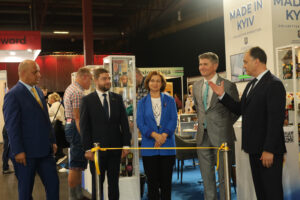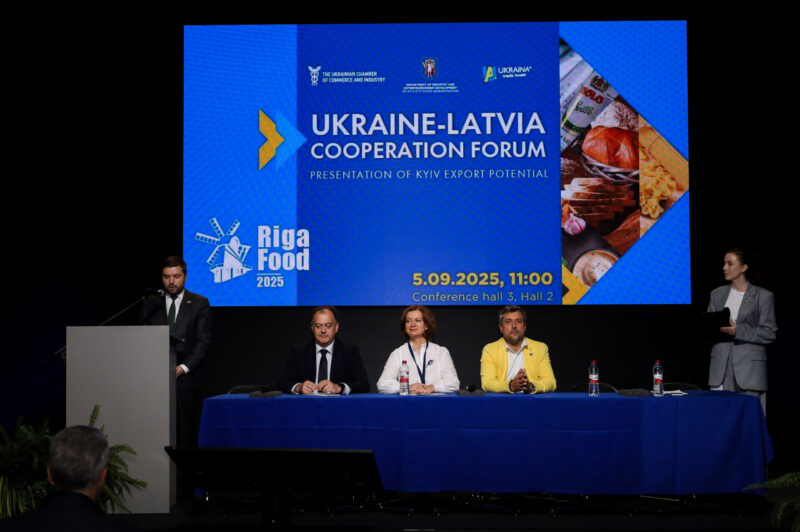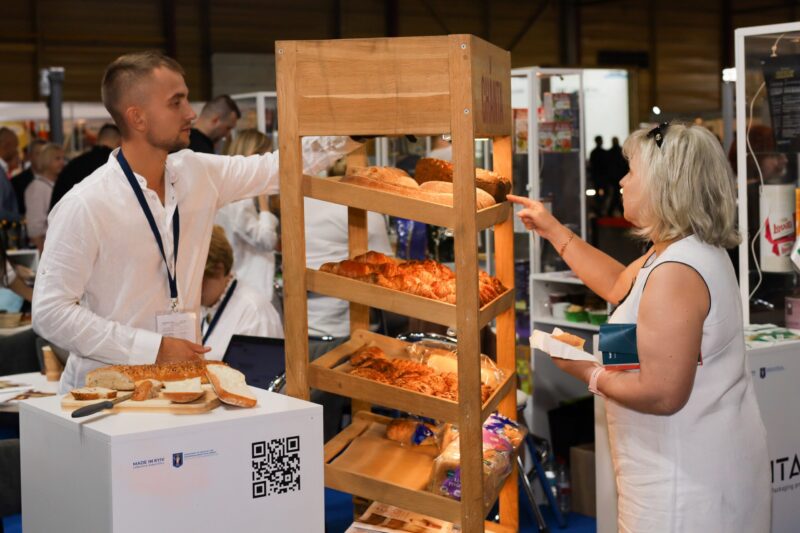
The European Bank for Reconstruction and Development (EBRD) is providing a risk-sharing guarantee without upfront financing to Raiffeisen Bank to expand financing and provide new loans to Ukrainian businesses in the amount of EUR200 million. The relevant agreement was signed in London on September 9.
“The EBRD instrument will cover up to 50% of Raiffeisen Bank’s credit risk under new financing agreements for businesses operating in Ukraine. Under this mechanism, the bank will provide sub-loans to companies operating in critical sectors of the economy, such as agriculture, industrial production, pharmaceuticals, transport, and logistics,” the Ukrainian bank said in a press release on Wednesday.
According to the press release, this is already the fourth such risk-sharing agreement concluded by the EBRD with Raiffeisen Bank.
It is noted that 20% of the sub-loans covered by the EBRD guarantee will be provided to MSMEs for long-term investments in EU-compliant technologies and green technologies, strengthening the competitiveness of such enterprises in domestic and foreign markets.
Sub-borrowers who meet the conditions will also be able to receive EU-funded technical support and investment incentives, such as grants to complete their investment projects, under the EU4Business initiative. Larger incentives will be provided to businesses and households most affected by the war (e.g., those whose assets have been destroyed, damaged, or relocated), as well as to sub-borrowers that promote the reintegration of war veterans, people with special needs, internally displaced persons, and/or enterprises located in areas most severely affected by the war.
The EBRD guarantee will be supported by partial coverage of first-loss risk received from France and the EU under the Ukraine Investment Framework.
Since the start of the full-scale Russian-Ukrainian war, the EBRD has enabled more than EUR 3 billion in financing to Ukrainian borrowers through 37 similar instruments in partnership with 12 financial institutions.
Raiffeisen Bank is the largest privately owned bank in Ukraine and the fourth largest overall, with total assets of UAH 252.23 billion (6.5% of the system’s total assets) as of mid-year.
Raiffeisen Bank was founded in 1992. According to the financial institution, 68.21% of its shares are owned by Raiffeisen Bank International AG (RBI), 30% by the EBRD, and the remaining 1.79% by minority shareholders.

From September 4 to 6, Riga hosted the leading food industry exhibition Riga FOOD 2025, where the capital was represented by the MADE IN KYIV collective stand. Over three days, 10 food and packaging manufacturers from the capital presented their products on an area of 36 m².
The grand opening of the stand was attended by Anatoliy Kutsevol, Ambassador Extraordinary and Plenipotentiary of Ukraine to Latvia, Maris Sprindžuks, Vice Mayor of Riga, Hanna Starostenko, Deputy Head of the Kyiv City State Administration, and Anatoliy Bahan, Deputy Director of the Department of Industry and Entrepreneurship Development of the Kyiv City State Administration.

The three days of the collective stand’s operation were intense and productive: the stand was visited by a large number of guests, product presentations were held, and lively negotiations and discussions on new prospects for cooperation took place.
Also, on September 5, the exhibition hosted a Business Forum on Ukrainian-Latvian Cooperation, organized by the Ukrainian Chamber of Commerce and Industry and Trade House Ukraina.
The atmosphere of the event confirmed the high level of interest in Ukrainian business and facilitated effective dialogue for the development of partnerships.

“The results of Kyiv’s participation in Riga FOOD 2025 confirm that the capital’s businesses have great export potential and are able to compete in international markets. We see a high level of interest in the products of Kyiv companies and are confident that the contacts established here will grow into lasting partnerships,” said Anatoliy Bagan, Deputy Director of the Department of Industry and Entrepreneurship Development of the Kyiv City State Administration.
The organizers of the Made in Kyiv collective stand are the Department of Industry and Entrepreneurship Development of the Kyiv City State Administration.
Interfax-Ukraine is an information partner.

Schneider Electric, a leader in digital transformation in energy management and automation, has announced the launch of the third chapter of its online School of Sustainability, a free training program designed to provide partners with the tools to become leaders in sustainability.
This chapter is dedicated to teaching businesses how to decarbonize and leverage the benefits of sustainability through electrification and digitalization. According to research, companies that fail to adapt to climate risks could lose up to 7% of their annual profits by 2035, underscoring the urgency of corporate climate action. The third section directly addresses this challenge by offering practical insights to help organizations remain resilient and profitable in a rapidly changing world.
The School of Sustainability, first launched to an external audience in 2023, offers interactive courses aimed at improving companies’ sustainability performance. The program consists of three parts and responds to the growing need for accessible, applied learning on key sustainability topics. Sections 1 and 2, which are already available, cover the basics of sustainability and the steps for building and implementing a decarbonization strategy.
Section 3 focuses on how companies can implement decarbonization through energy efficiency improvements, carbon footprint reduction, and leveraging the strategic advantages of sustainable development.
It presents individual roadmaps for key industries, including:
This section introduces practical tools and solutions that make sustainable transformation real and profitable for both businesses and their customers. It is a starting point for improving the efficiency of companies and turning sustainable development into a competitive advantage.
“I am proud to launch the new section of our School of Sustainable Development — it is an important step that brings everything together into a single, coherent system. As part of our ongoing support for partners and customers on their path to sustainability, this section will provide them with the tools and knowledge to implement sustainable development principles in their organizations and for their customers,” said Soroush Heradmand, Head of Partner Sustainability at Schneider Electric.
“As the world becomes increasingly digital and electrified, our partner ecosystem is uniquely positioned to address today’s energy challenges,” added Frederic Godemelle, Executive Vice President of Energy Management at Schneider Electric. “Every business, regardless of size, plays an important role in the energy transition. We strive to help them turn sustainability into a competitive advantage by combining environmental and economic benefits for success in a rapidly changing world.”
About Schneider Electric
Schneider’s goal is to create impact by empowering everyone to make the most of our energy and resources, enabling progress and sustainability for all. We call this Life Is On.
Our mission is to be a trusted partner in sustainability and efficiency.
We are a global leader in industrial technology, bringing global expertise in electrification, automation, and digitalization to smart industries, reliable infrastructure, future-ready data centers, intelligent buildings, and intuitive homes. Leveraging our deep industry expertise, we provide integrated, end-to-end industrial IoT solutions powered by artificial intelligence with connected products, automation, software, and services, creating digital twins to deliver profitable growth for our customers.
Our company’s main resource is our 150,000 employees and over a million partners working in more than 100 countries around the world to ensure proximity to our customers and stakeholders. We support diversity and inclusion in everything we do, guided by our meaningful goal of a sustainable future for all.
Discover the latest insights shaping sustainability, Energy 4.0, and next-generation automation at Schneider Electric Insights.

In 2024-2025, medium and large businesses in Ukraine will more often choose private clouds – due to the requirements for data control and compliance with security standards. The trend has intensified against the backdrop of war and regulatory requirements, notes Volodymyr Bjelov (GigaCloud) in a column for Interfax-Ukraine.
The key change is the transition from “formal incident plans” to built-in cybersecurity: PAM, SIEM, SOC, encryption, DDoS protection are now considered at the level of cloud solution architecture, rather than as an “add-on”.
GigaCloud is a Ukrainian cloud provider (part of GigaGroup), founded in 2016. The company provides IaaS/PaaS services, virtual data centers, redundancy and continuity solutions (DR/BCP) and GPU clouds. The infrastructure is hosted in data centers in Ukraine and the EU (Kiev, Lviv, Warsaw) with TIER III/IV compliance; the provider has VMware Cloud Service Provider (Premier) statuses and is registered in CSA STAR Registry, portfolio – over 1.5 thousand customers.
ARCHITECTURE, BUSINESS, GigaCloud, private clouds, SECURITY, Vladimir Bjelov

Mobile operator lifecell, part of the DVL (Datagroup-Volia-lifecell) group of companies, attracted over 1,400 businesses that transferred their business numbers to it in July, according to a press release.
“As of July 2025, more than 1,400 companies have transferred thousands of business numbers to the lifecell network, choosing the operator’s tariffs and services. In 2025, lifecell recorded a twofold increase in the volume of corporate number transfers compared to the same period in 2024,” the lifecell press service said in a statement on Tuesday.
It is noted that the procedure for transferring business numbers consists of three stages and takes up to three working days.
Earlier it was reported that in January-June 2025, lifecell became the leader among operators in terms of the number of subscribers.